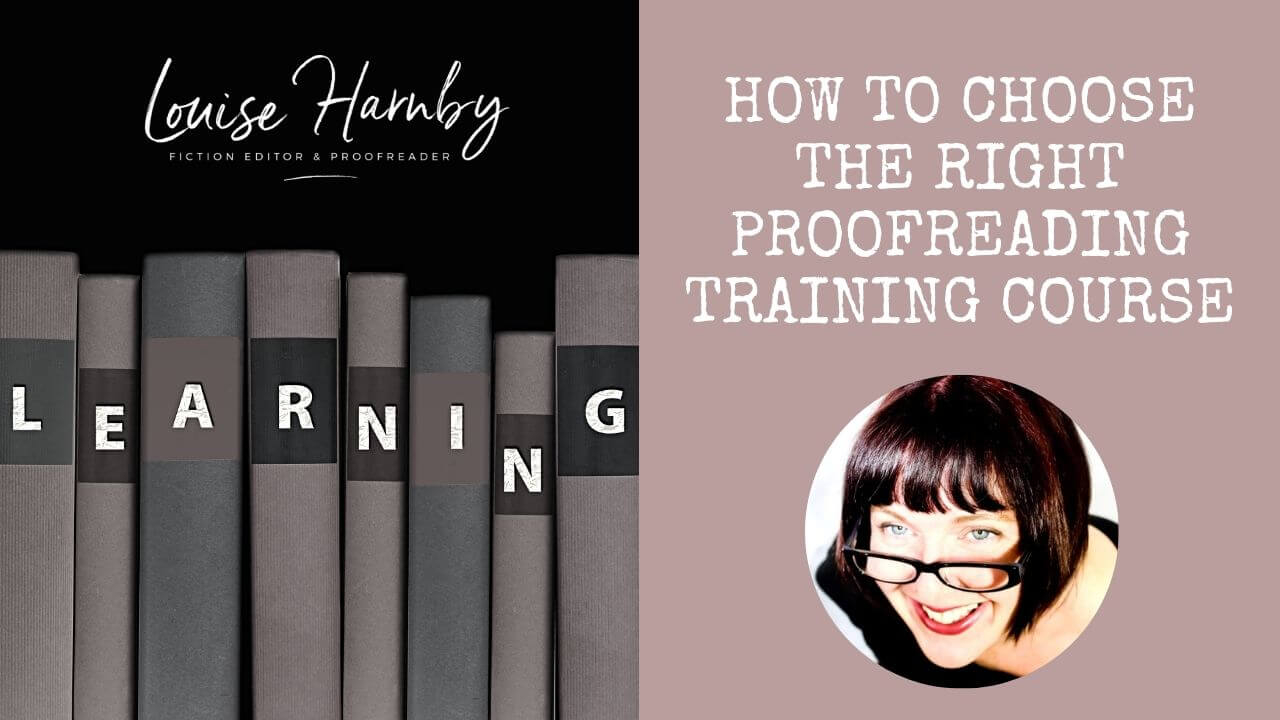|
A short question on this blog about which training course I would recommend for someone considering a career in proofreading prompted a rather long reply from me. It made me realize that the issue deserved a post of its own.
Professional proofreading training
Please note that this article isn’t designed to recommend one particular course over another. What you choose will depend on a number of factors, e.g. location, career stage. Readers of this blog who’ve searched my training archive will know the course I chose – the Publishing Training Centre's Essential Proofreading. While I found this course to be outstanding, this accolade is based on my business plan, my place of residence, my knowledge of the market I chose to focus on, and my training budget. It won’t necessarily be the right choice for, say, a Belgian with a different niche market in mind, or a Canadian whose pockets are feeling a little shallow at the moment. Instead, the aim here is to give voice to some of the basic issues that are worth considering when choosing what, where and how to train for a career as a freelance proofreader, wherever you live and whatever your budget. What’s on offer? The options are numerous. Distance learning and on-site; online and book-based; and DIY and professionally assessed. Some cost hundreds of pounds while other options cost less than the price of a family cinema outing. Googling for proofreading training courses throws up lots of information but little guidance on how to make a choice. Here are some ideas to get you on the right track. Is there a national or regional professional society you can contact? This is probably the best place to start. Get in touch with your national editing/proofreading society and see what they recommend. Their membership is full of people who were once in your position, so they will have some great advice to share, and at no cost. Visit my Editing & Proofreading Societies page to locate your national association or regional chapter. At what stage are you in the process? Consider what point you’re at in the process of your career change. Are you definitely looking to become a professional proofreader or are you at the earlier stage of considering it as one of several options? If the latter, you might opt for a cheaper, preliminary short course to see if the work suits you before you invest a larger amount of money in a more time-consuming distance learning course. If you've recently completed some training you might want to consider a mentoring programme. The Chartered Institute of Editing and Proofreading (CIEP) runs a mentoring programme in the UK. Contact your national editing and proofreading society for more details on mentoring opportunities in your own country. What kind of client are you hoping to target? Case study 1 You’re an ex-solicitor/attorney who’s decided that the law’s not your bag after all. You decide you want to focus on publisher clients, possibly those with lists in criminology, law and policing. Do some research to find out which houses publish in these fields and give them a call. Ask to speak to the production manager, or the person in charge of hiring freelance editorial staff. Ask that person what their criteria are for freelancers. They'll be able to tell you the training providers they recognize. They’ll also be able to give you some ideas about any experience or expertise they are looking for. You may be surprised to find that they accept a qualification that you hadn’t considered. And it may not be the most expensive one on the market. Even if you do find out that you would be better off going for one of the more expensive training courses, at least you know that it will be money well spent and that you’ll get the return on your investment once you start applying for paid work. Getting a feel for what publishers want is a good start because they are one type of client that is in a position to offer you repeat work. Case study 2 You’ve worked as an English-language teacher for years in a school or college, helping young adults improve their literacy skills. You decide to focus on independent fiction and creative non-fiction authors who are looking for the final polish before they submit their manuscript to an agent, in-house commissioning editor, or custom-publishing organization. You need to do the same research. Start networking with writers’ groups and online networks and ask the people themselves what training and experience they expect a proofreader to have. They may have a set of very different preferred externals based on their experiences of commissioning freelance editorial services. Join social networking forums such as LinkedIn where existing freelancers congregate and ask what training routes other freelance proofreaders in your country, who work with the type of client you’re interested in, took to get their careers off the ground. The point is to research your market and find out what people want and expect. Every training provider on the market will tell you that their course is the best, and they wouldn’t be doing a good job of marketing themselves if they claimed otherwise. Asking the end-users, however, is the key to ensuring you make the decision that best suits your business strategy. Assessed or not? Assuming you’ve decided proofreading is the job for you, and you need a training course that is going to give you the confidence and readiness to do the job to a professional standard, find out whether your training provider offers an assessment element. It’s best to iron out the creases while you are training, rather than alienating unhappy clients further down the line. Or to quote an old proverb: What the fool does in the end, the wise man does in the beginning.
Louise Harnby is a line editor, copyeditor and proofreader who specializes in working with crime, mystery, suspense and thriller writers.
She is an Advanced Professional Member of the Chartered Institute of Editing and Proofreading (CIEP), a member of ACES, a Partner Member of The Alliance of Independent Authors (ALLi), and co-hosts The Editing Podcast. Visit her business website at Louise Harnby | Fiction Editor & Proofreader, say hello on Twitter at @LouiseHarnby, connect via Facebook and LinkedIn, and check out her books and courses.
49 Comments
If you don't have the full paid-for versions of, say, Adobe Acrobat or PDF-XChange, you can still use my proofreading stamps. At a recent local SfEP chapter workshop, my colleague Sara Peacock demonstrated the stamps. She says: "The stamps work with [the free] Adobe Reader, but the proofreader will need to ensure that whoever creates the PDF 'enables comments' before sending it, otherwise the comment tools that are needed (as well as the stamps, the pencil tool, the strikeout tool, and so on) won't be accessible. "However, all of these tools (or their equivalents) are available in the free PDF-XChange viewer, in which the stamps can also be used. (Personally, I find it a more stable piece of software than the Adobe version so I use it all the time anyway. It's a bonus that I don't need to insist on enabled PDFs.)" I normally work in the full version of Acrobat Standard, but following Sara's comments I decided to give XChange Viewer a try. I must say, it was a doddle and the functionality is exceptional given that this won't cost you anything. The stamps palette is much clearer, for one thing, and uploading the stamps is quicker, too. I'd recommend giving Viewer a try, even if you're a die-hard Acrobat user! Even better, XChange Viewer allows you to upload them all in one go! To access the stamps files, see the article Free Downloadable Proofreading Stamps. For a more detailed look at using stamps for onscreen work, go to PDF Editing: Making the Most of the Stamps Tool. For installation instructions, click here. Tips
Louise Harnby is a line editor, copyeditor and proofreader who specializes in working with crime, mystery, suspense and thriller writers. She is an Advanced Professional Member of the Chartered Institute of Editing and Proofreading (CIEP), a member of ACES, a Partner Member of The Alliance of Independent Authors (ALLi), and co-hosts The Editing Podcast. Visit her business website at Louise Harnby | Fiction Editor & Proofreader, say hello on Twitter at @LouiseHarnby, connect via Facebook and LinkedIn, and check out her books and courses. |
BLOG ALERTSIf you'd like me to email you when a new blog post is available, sign up for blog alerts!
TESTIMONIALSDare Rogers'Louise uses her expertise to hone a story until it's razor sharp, while still allowing the author’s voice to remain dominant.'Jeff Carson'I wholeheartedly recommend her services ... Just don’t hire her when I need her.'J B Turner'Sincere thanks for a beautiful and elegant piece of work. First class.'Ayshe Gemedzhy'What makes her stand out and shine is her ability to immerse herself in your story.'Salt Publishing'A million thanks – your mark-up is perfect, as always.'CATEGORIES
All
ARCHIVES
July 2024
|
|
|
|



















 RSS Feed
RSS Feed





